Business resilience is all the rage, and no wonder. The COVID-19 pandemic, while horrific on a social and economic level, is just the latest in a long series of convulsions that expose the vulnerabilities or brittle characteristics of unprepared companies. Recent years have brought major shocks, including international trade wars, a plunge in oil prices and a financial crisis – each of which pulled the rug out from exposed companies. An increased march of government interventions have started to limit the options of technology giants as varied as Ant Financial, Google and Huawei.
Now, of course, companies are buffeted by the coronavirus outbreak and subsequent economic crash. The pandemic squeezed off critical supplies of drug components from Asia, which exposed the dependency of pharma companies on far-flung supply chains. For more than a decade, pharma companies sought to lower costs by relocating a significant share of their manufacturing capacities to China and India. That directly affected supply chain reliability in 2020, with manufacturing site closures and impaired transportation routes immobilising supply chains, leading to significant drug shortages in many countries while demand surged.
Resilience clearly has become more important for companies in all sectors. And the turbulence looks set to continue as globalisation unwinds, inequality rises, new technological risks emerge, and the effects of climate change manifest themselves more regularly and severely. Yet the dynamics of resilience aren’t always well understood by senior executives and boards of directors. We challenge leaders to consider:
- Most of the things you’ve been worrying about are too short-term and modest.
- Improving resilience doesn’t have to come at the expense of shareholders.
- If you don’t get ahead of the challenge of becoming more resilient, expanding government regulations or restrictions – such as forgoing dividends or stock buybacks in return for bailouts – may further limit your options.
The corrosive fixation on efficiency
How did we land in this predicament? The stability of recent decades enabled the fastest growth in profits since the middle of the 20th century; from 1990 to 2018, the profit pool of companies in developed economies grew at more than double the rate of GDP. Through this period, the relative predictability of the business environment enabled firms to pursue efficiency that helped fuel this exceptional profit growth.
Yet this focus on efficiency has come at the cost of increasing structural fragility. Firms bulked up on leverage – with US non-financial corporate debt-to-GDP ratios rising from around 30% in the 1980s to just shy of 50% today – and used debt to ratchet up cash payouts to shareholders, which in turn have risen from 78% of net income in 1999 to over 100% today. At the same time, many firms consolidated supply chains to drive increased bargaining power, and introduced just-in-time and redundancy-free operations to eliminate waste.
While having a focused portfolio is critical to sustained value creation, it has also created hidden tension points that leave some firms vulnerable to sudden changes in circumstances. Spirit Aerosystems, a leading fuselage manufacturer that depended heavily on one customer, Boeing, experienced this problem when troubles with the 737 Max aircraft forced a major restructuring. Spirit recently took steps to build greater resilience, such as acquiring assets from Bombardier that would help it boost business with Airbus.
Samsung Electronics’ experience, by contrast, illustrates the increasing value of a more balanced revenue and profit portfolio. In 2016, Samsung’s position in the smartphone market was jeopardised when the battery in its new Note 7 product caught fire under certain conditions. The news triggered a $5bn recall. However, the firm was able to push through the crisis thanks to the breathing space created by offsetting growth in its semiconductor and display panel businesses.
The shape of Samsung’s portfolio afforded it the time and investment needed to resolve the root causes of the battery failure and deliver a new flagship product (the Galaxy S8) with a series of innovative features to win back customers.
At a macro level, the fixation on streamlining and efficiency has steadily increased risk. Comparing the periods 1980–1999 with 2000–2018, we found that the volatility of the aggregate profit pool in developed economies increased by 60% (figure 1)
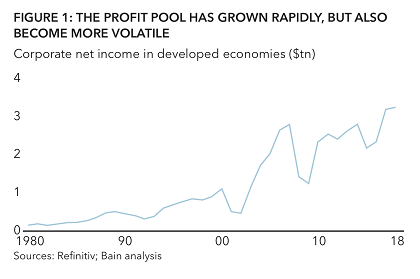
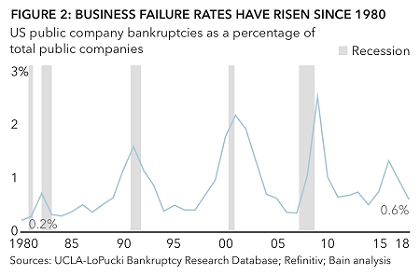
Looking at public US firms, the bankruptcy rate tripled between 1980 and 2018. Both aggregate volatility and business failure rates would have been far higher if not for an unprecedented level of government support.
Banks’ experience after the financial crisis, particularly in Europe, offers a cautionary tale. Prior to the 2008 crash, European banks not only enjoyed rapid growth but also a rising return on equity that reached mid-double digits. Since then, returns have fallen to low single digits and well below the cost of capital. This resulted partly from broader economic malaise in Europe and the continued hangover from bad loans, but also reflects a significant step change in the amount of regulatory capital these firms are now required to hold as the price of government bailouts.
Faced with mounting evidence that the current enterprise risk-management playbook is no longer adequate, senior executives and boards are starting to shift their thinking about resilience. Even those that managed to hustle their way through the pandemic on the back of heroic efforts by employees and partners sense that they need a more sustainable approach.
But here’s the rub: Like the rush to digital everything a few years back, much of the discussion doesn’t really explore what resilience means for each company, and what it will take for a firm to improve. In our recent conversations with business leaders, we’ve come to recognise five stubborn myths that distort the discussion. Dispelling these myths is the first step on the road to resilience.
Myth 1. Resilience eliminates volatility
In current times, the likelihood and consequence of events cannot be forced into a tidy probability distribution. As a case in point, consider how ineffective most polling proved in forecasting recent US elections or the British vote to leave the European Union.
In such an environment, it’s both unrealistic and unhelpful to treat resilience as a trait that will eliminate earnings and share price volatility. Instead, we distinguish volatility – predictable fluctuations in every business over time – from true risk – exposure to a lasting adverse change in trajectory.
In fact, trying to minimise volatility is a bit like buying insurance that protects against the deductible, rather than the loss itself. It misses the bigger objective of ensuring that the inevitable surprises encountered along the way don’t permanently damage a firm’s ability to generate an acceptable return on the capital invested across the cycle.
Rather than focusing on earnings certainty, management teams and boards can more usefully ask what the real risks are that they want to hedge against. Bankruptcy? Default? Rating downgrade? Hostile takeover? Activist investor? Failure to properly define risk appetite is the original sin in many discussions on resilience.
Myth 2. It’s all about the balance sheet
Business leaders often tend to view resilience solely through a balance sheet lens, examining leverage and liquidity, but ignoring other potential sources of fragility. In fact, resilience spans five dimensions:
- strategic, including absolute and relative scale, demand elasticity, revenue and profit diversification and cross-correlations;
- financial, including leverage and liquidity, but also insurance coverage and hedges;
- operational, including operating leverage, supplier concentration and redundancy;
- technological, including availability, workload mobility and cybersecurity; and
- organisational, including crisis preparedness, organisational agility and personal resilience.
Adopting a holistic view of resilience acknowledges the reality that external events typically affect companies through several of these dimensions simultaneously, compounding the extent of the shock. Accounting for all these dimensions allows executives to make smarter choices about where to invest scarce resources in resilience.
Nissan’s experience illustrates the point. Through the 2000s, Nissan took a number of steps to reduce risk. These included developing detailed crisis playbooks with clear disaster-recovery plans and regular simulation training; a more geographically dispersed production base and diversified supply chain than its peers; and proactive steps with suppliers to ensure that they had plans for switching production during a crisis. These preparations paid off handsomely during the 2011 earthquake in Japan, with the automaker returning to production after about two months.
The experience of Southwest Airlines further demonstrates the breadth of factors that contribute to resilience. During the pandemic, the strengths of Southwest’s network, business model and balance sheet have enabled it to expand to new destinations while other airlines are retrenching. This also reflects its disciplined approach to making all customer segments profitable, rather than relying on subsidisation from the international and premium business segments, which have been hardest hit throughout the year. The airline’s proactive approach to risk also served it well during the oil price spike in the early 2000s, where actions such as hedging helped avoid the fate of other carriers that filed for bankruptcy restructuring.
In many cases, resilience also stems from the overall simplicity and transparency of the business model. During the 2008 financial crisis, many banks were undone by the sheer complexity and opacity of the mortgage-backed securities they were so heavily exposed to, which made the proper assessment of risk nearly impossible. Likewise, during COVID-19, complex and opaque supply chains have left many firms exposed to shortages of parts or components they hadn’t realised were so critical.
Myth 3. Past resilience guarantees future resilience
Once the dust settles from the COVID-19 crisis, most firms will likely be better prepared to deal with the next pandemic, just as banks are better prepared for the next mortgage crisis. ‘Black swan’ events, however, look different to the crises in recent memory.
Building true resilience demands asking what could happen that would truly test the business, rather than anchoring on recent experience. Many companies that have shown resilience in responding to strategic and financial shocks have suffered from major technology outages – sometimes due to the failure of just one router or server – and cyberattacks. As the trends to digitalise and automate operations accelerate, technology will pose greater risks that some firms haven’t yet prepared for.
Trying to identify and quantify the universe of all possible shocks is a fool’s errand. Instead, thoughtful executives will build the necessary organisational muscles to evaluate which shocks matter most (in both impact and likelihood) based on industry- and firm-specific economics. Although many potential shocks exist, the number of transmission channels through which these could really damage a particular business is much lower. In the airline industry, for instance, this short list would include the price of oil, fleet availability and travel restrictions. Every industry will have a different list, and knowing the critical transmission channels for an individual firm is an essential step in building resilience.
The shape and weighting of risk is particularly heterogeneous. Each firm should understand its unique risk profile, based on its specific cost structure, customer segments, supply chain, route to market, and more. In other words, approach risk like a founder kept awake at night reflecting on the hazards that could destroy his or her life’s work.
Myth 4. Resilience should be handled by the risk function
Too often, risk gets treated as an obligatory but unfortunate box-checking exercise, then relegated to a corner of the business. Accepting this more limited scope, risk functions may fall into the trap of becoming overly tactical and blinkered in their identification of risks.
This approach falls short in a world of greater turbulence. The combinatorial nature of many risks demands that companies identify and mitigate risks for the entire business. A piecemeal buying down of specific risks in specific functions and business units will probably not achieve the resilience needed for the business as a whole (or at least not at an acceptable cost). Moreover, many future risks will emerge from the ecosystem of partners outside the firm, and traditional risk-management functions are ill-suited for this challenge.
Instead, firms will need to elevate and integrate risk into the rhythms and rituals of their most important decision-making processes at the C-suite and board levels. Rather than making decisions based mostly on the upside, and protecting against a few siloed areas of risk, business leaders at all levels should adopt an ownership mindset that fully accounts for how decisions will affect value creation across the business over the long term.
The experience of Swedish bank Handelsbanken suggests a potential model. Founded in 1871, Handelsbanken is the oldest company listed on the Swedish stock exchange, and an exemplar of resilience. During both the Swedish banking crisis of the early 1990s and the 2008 financial crisis, it was the only bank in Sweden that didn’t require government aid. One major factor underlying the bank’s resilience has been its model of empowered local decision making. The business operates with only three management layers – CEO, regional manager and branch manager – and local branch managers have the authority to make most decisions. Instead of receiving bonuses, employees participate in a profit-sharing system in place since 1970, with profits redeemable on retirement. This structure gives staff incentives to make decisions that sustain value over the long term, rather than maximise this year’s earnings.
Myth 5. Resilience doesn’t require difficult trade-offs
Can a firm shield itself against future shocks without compromising earnings today? True, firms will be able to identify no-regret moves that add to resilience without denting current profitability, such as improving supply chain visibility or introducing crisis readiness. And, as noted above, a holistic, firmwide approach to resilience can often improve cost-effectiveness. However, gaining a meaningful edge on resilience will often entail investment and opportunity cost.
Here, business leaders will have to expand the dialogue with investors on balancing short-term and long-term value creation. For their part, many investors are trying to balance the desire for responsible stewardship of capital over the long term with the need to avoid allocating funds to systematic underperformers.
One sticking point in this dialogue concerns disagreement over the right metrics. To that end, we’ve constructed the Bain Resilience Index, a 100-point scale that assesses a company’s resilience based on the statistical relationship between performance during a crisis and a wide range of readily observable metrics including scale, growth, margin, asset intensity, leverage, liquidity, and geographic and product concentration. While these metrics offer only a partial assessment of resilience, understanding one’s relative position on these basic dimensions will serve as a useful start for any fact-based dialogue with investors.
In every industry, there’s a wide range of resilience among individual companies (figure 3).
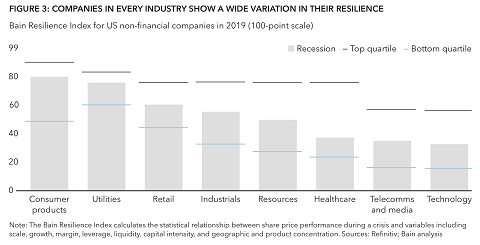
For larger firms with at least $1bn of annual revenue, other factors play a greater role, such as debt levels, revenue diversification or choices around asset ownership. We tracked the shareholder returns of larger firms that remained publicly listed from 2000 through 2019. Those that took on greater risk (with a Bain Resilience Index below 70) tended to underperform in years when the broader economy contracted but outperform in expansionary years (figure 4).
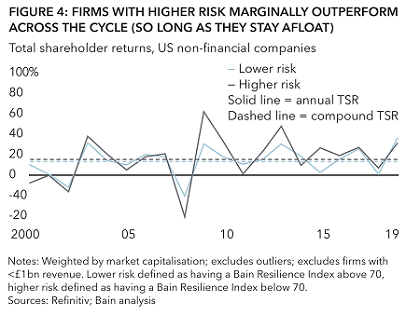
In aggregate, their higher volatility was compensated through marginally higher returns across the cycle, as an investor would expect.
But low-resilience firms pay dearly in another respect, with significantly higher rates of bankruptcy or acquisition. Indeed, over this period high-resilience firms had nearly double the survival rate of their low-resilience counterparts (figure 5).
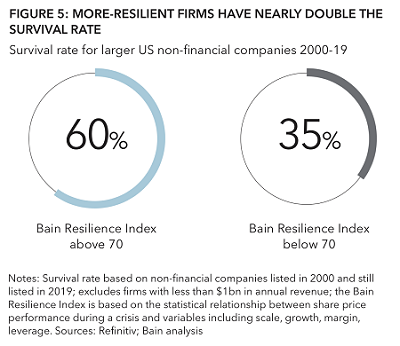
In other words, a strategy of higher risk works for those that manage to stay afloat despite the volatility. The question is whether these gains are worth the risk of failure.
Building resilience involves difficult, nuanced trade-offs. In recent decades, many firms found that a strategy of sailing close to the wind generated unquestionable value for shareholders (especially in upturns), provided they steered clear of catastrophic failure. Looking ahead, each firm will have to determine how much to recalibrate and add resilience in order to continue creating value while avoiding the risk of crushing loss.
Getting comfortable with the grey areas
Once you get past these five myths, it’s clear that there’s no single solution or quick fix, no binary black-or-white choices, but rather a series of decisions in the grey areas of marginal risk. Developing the right level and type of resilience demands a combination of long-term vision, a deep understanding of company and industry economics, and a significant dose of creativity.
That said, a straightforward, three-step approach can set the wheels in motion:
- Assess your exposures. Begin with a rigorous, fact-based analysis of the nature and extent of your major vulnerabilities. Use hard data to illuminate what drives profit in your industry and firm. Design benchmarks to better understand your resilience relative to competitors. Use stress-test modelling to delineate the limits of your defences and ensure that you’ve accounted for second-order effects.
- Agree on your specific appetite for risk. Align the senior executive team and board on a shared understanding of the firm’s resilience track record, and agree on the level of tolerance for risk in the future. Beware of generic, half-hearted exercises that tempt leadership teams to default to an ambition of ‘moderate’ risk. Insist on specific goals informed by answering the hard questions. This will likely require some back and forth with the previous step, and will inevitably land in the grey zone of investments to manage marginal risks.
- Set your game plan and win over investors. Draft a resilience agenda based on a combination of low-hanging fruit and high-gain investments. Bring your investors along on this journey, by recrafting the equity story to demonstrate how the new actions will maximise shareholder value through the economic cycle.
Embarking on the road to resilience does require a commitment from senior leaders and board members, who will need to make difficult choices. They might welcome this endeavour as an opportunity to set themselves up for success.
Who believes that the turbulence of recent years will abate? That seems like very long odds. Those who expect continued or greater volatility will be able to take strong countermeasures only if they start preparing now.
About the author
Thomas Devlin is senior manager at Bain & Company London, and manages research for the firm’s think tank Bain Futures.
This article was written with other Bain colleagues: Dunigan O’Keeffe, partner, San Francisco; Hernan Saenz, partner, Dallas; and Andrew Schwedel, partner, New York. It was first published on bain.com in January 2021 and is republished here with permission.
Related resources
More support on business
Read our articles, eBooks, reports and guides on risk management.
Risk management hubeBooks on risk